This Code of Ethics is intended to contribute to the quality of the RAUSP Management Journal, to ensure its reliability for editors, authors, reviewers and readers. The code is based on the ANPAD Manual of Good Practices (ANPAD 2010), the Code of Conduct and guidelines for best practice for Editors of Scientific publications of the Committee on Publication Ethics (COPE 2011), and the established practices of scientific publishing in the Administration area.
1. Questions concerning the Publication and Authorship
Authors should list and cite appropriately, in accordance with the instructions provided in a specific page, the works that formed the basis for the development of their research. Furthermore, they should provide information, if applicable, on the sources of research funding, as an acknowledgement at the end of the article or in a footnote at the beginning.
The authors should state that the articles are their own work, and that any third party material used is referenced and used in a legitimate way. Plagiarism, falsification or fabrication of data will not be allowed.
The authors should state that the articles submitted for evaluation and their essential content are original and are not under evaluation by another publication.
2. Authors’ responsibilities
The authors included in the article should have contributed significantly to the development of the work, and it is not permitted to include additional authors after acceptance of the article.
If the authors are successful in publishing an article in RAUSP, they may be called to review an article for the magazine (ANPAD, 2010). If the authors are asked to act in this role, they must do so with dedication, promptness and scientific seriousness, thereby contributing to the improvement of the article.
3. The peer review process and Reviewer’ Responsibilities
Reviewers and their Responsibilities
They should only agree to review a manuscript if they:
Reviews:
4. Editorial responsibilities
The editors of RAUSP undertake wherever possible (based on COPE, 2011):
The editors will strive to maintain the quality and relevance of the publication, which includes ensuring that the evaluation of submitted papers is objective, fair and conducted in accordance with the norms and standards of scientific research in the field of ??Administration. The editors, through the selection of evaluators, will seek to promote a competent and impartial assessment of submitted articles.
The editors will seek reviewers who do not belong to the same institution as the authors and are not co-authors of the same. They will also seek to forward submissions to reviewers with qualifications compatible with the work to be assessed (ANPAD, 2010).
The editors of RAUSP have full responsibility and authority to reject / accept articles
The final decision to accept or reject articles rests with the publishers, who consider the quality, originality, relevance and adherence to RAUSP’s editorial line.
This decision may possibly counteract the recommendations identified by the evaluators, as long as it is duly substantiated. “The editor is not hostage to the opinions and views that come, but if he needs to counter them, he must act with a very clear ethics and insight.” (ANPAD, 2010)
The editor should have no conflict of interest in relation to articles he or she rejects / accepts.
If a conflict of interest is identified, the editor will pass the responsibility for the decision to a member of the editorial committee who is free of such a conflict.
The editors should only accept an article if they are reasonably certain about that decision.
Editors should publish corrections when they find some error in the publication.
Editors should preserve the anonymity of the evaluators
All those involved in the evaluation process must ensure the confidential treatment of submitted manuscripts.
Editors must not use or misappropriate the knowledge acquired during the evaluation process of the articles.
5. Issues of Ethics in Publishing
Monitoring / safeguarding of the publication’s ethics by the Editorial Board
The Editorial Board of RAUSP is responsible for monitoring compliance with this code of ethics. Furthermore, it should be aware of changes in patterns of scientific publishing in the area of ??Administration.
Guidelines for retraction of articles (Based on COPE, 2010)
The editors of RAUSP may consider the retraction of an article if:
Notices of retraction should mention the reasons and bases for retraction (to distinguish misconduct cases from those of honest mistakes) and should also specify who is retracting the article. They should be published in all versions of the journal (print and electronic) and should include the title of the article and its respective authors.
Maintaining the integrity of the academic record (Based on COPE, 2011)
Upon recognizing the publication of any misleading statement or distorted account, the Editorial Board must promptly correct it and give the correction due prominence in the journal.
If, after appropriate investigation, it is proved that an item is fraudulent, the latter should be retracted. The retraction must be clearly identifiable to readers and indexing systems.
References
ANPAD ANPAD Manual of Practice of Scientific Publication, National Association of Graduate Studies and Research in Management, Rio de Janeiro, 2010, available at http://www.anpad.org.br/diversos/boas_praticas.pdf, accessed 10/13/2013
COPE, CODE OF CONDUCT AND BEST PRACTICE GUIDELINES
JOURNAL FOR EDITORS, COPE Committee on Publication Ethics, available at http://publicationethics.org/files/Code_of_conduct_for_journal_editors_1.pdf, accessed on 13.10.2013
Subscribe for free and receive a monthly email alert that lets you know when each new edition is online
